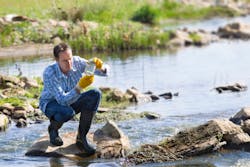S.C. water officials use algaecide to treat ‘musty’ taste caused by MIB
SPARTANBURG, S.C. — Nov. 16, 2015 — Spartanburg Water has reassured customers its water is safe to drink and for household uses like bathing, washing clothing and dishes following the deployment of a new tool to tackle Methyl-Isoborneol, or MIB, which was leading to a “musty” taste and odor, according to a press release.
Residents of Spartanburg County complained about the water quality after detecting an unusual taste and odor, leading to tests that uncovered elevated levels of MIB, noted the release.
Experts at The School of Agricultural, Forest and Environmental Sciences at Clemson University identified that the issue was caused by MIB-producing organisms during laboratory tests.
To address the historically high MIB levels, the experts recommended the use of approved algaecides in water supply reservoirs within the Spartanburg Water watershed, stated the release.
Spartanburg Water officials treated its surface water reservoirs with an environmentally friendly algaecide on October 26 and 27 (at its Municipal Reservoir Number 1), and on November 11 and 12 (on Lake Bowen), reported the release.
Ken Tuck, director of water treatment at the company, said in the release that the treatment was successful. “As of the sample taken this week, we have seen more than a three-fold decrease in MIB levels in our raw water source.”
However, levels of the algae still remain higher than normal, based on continuous monitoring of the water — with more than 265 tests being conducted daily, the company added. The situation could continue for a number of weeks.
Approved algaecides are commonly used to treat a variety of algae species in potable water sources, including ponds, lakes, drinking water reservoirs and irrigation systems, among others, and are considered one of the best lines of defense, particularly in controling MIB, shared the release.
You can find the entire release here.
